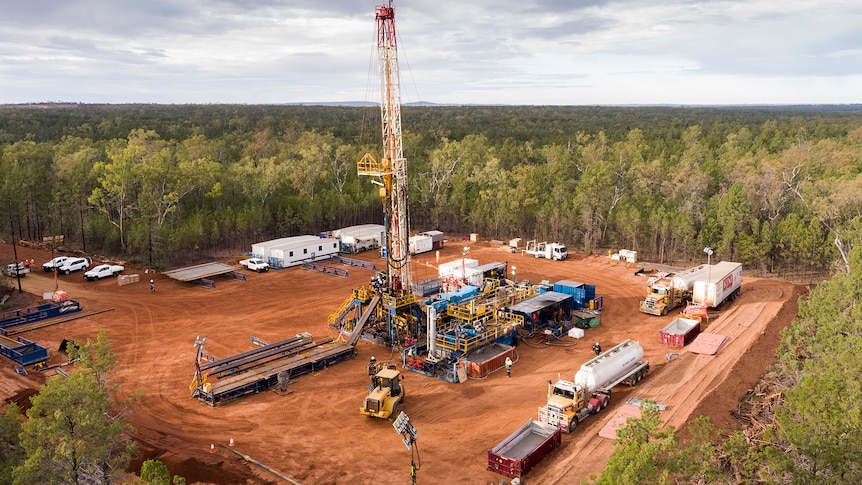Queensland’s Surat Basin may be home to the state’s main coal seam gas region but it could be about to get a whole lot bigger.
Key points:
- Senex Energy announces a $1 billion expansion of its natural gas developments in the Surat Basin
- CEO Ian Davies says the supply will mostly be for the domestic market
- The expansion is set to create 200 jobs during construction and 50 ongoing roles
Senex Energy, which is owned by Gina Rinehart’s Hancock Energy and South Korean steel maker Posco, has announced a $1 billion expansion of its natural gas developments in the Surat Basin, which includes hydraulic fracturing, or fracking.
The expansion, which still needs approval from federal Environment Minister Tanya Plibersek, will increase the company’s gas production to 60 petajoules (PJ) per year from the end of 2025.
Producing enough electricity to power more than 2.7 million homes each year, it is equivalent to more than 10 per cent of the east coast’s annual domestic gas requirements.
In a speech to industry leaders in Brisbane on Thursday, federal Resources Minister Madeleine King urged them to expand amid warnings a gas shortage could lead to higher prices.
“More supply of gas is a good thing in the domestic market and for the international markets,” Ms King said.
“We want to have a sustainable and ongoing system of gas supply for the domestic market, while also honoring the arrangements companies have in place and Australia has in place with our international partners.”
Filling domestic demand
According to the Australian Competition and Consumer Commission’s (ACCC) interim report of its inquiry into gas supply, there is a significant risk to the east coast’s energy security in 2023.
“The outlook for 2023 is very concerning and is likely to place further upward pressure on prices, which could result in some commercial and industrial users no longer being able to operate,” the report said.
“Liquified natural gas (LNG) exporters are expected to contribute to the shortfall in 2023 by withdrawing 58PJ more gas from the domestic market than they expect to supply into the market.”
An ‘obligation’ to Asia
Senex Energy chief executive Ian Davies said the supply would be mostly directed to the domestic market.
“[The] majority is absolutely domestic, but we do have an obligation, which we take quite seriously, [in] supporting our Asian neighbors to decarbonise and provide energy security,” he said.
“We have an [international] supply arrangement with Gladstone LNG for a minority of that 60PJ.
“We’re fundamentally a domestic company focused on a domestic supply.”
Landowners ‘deeply concerned’
Senex said its expansion would create 200 jobs during construction at its Atlas and Roma North projects, and 50 ongoing roles, and inject $200 million into the region’s economies.
But property owners in Queensland’s south-west have already felt the impact of gas wells in their backyard.
Ellie Smith of the Lock the Gate Alliance said she was “deeply concerned” about the impact of Senex’s proposed expansion.
“We don’t believe that will have any impact on prices that Queenslanders are facing with this gas price crisis,” she said.
“We’re seeing gas exported overseas when we need it at home, and the only way that we can bring energy prices down is by supporting manufacturers and Australians to shift to renewables.
“What we need to see the federal government do is put in place the gas price caps and the gas trigger to keep more gas onshore to really combat this predatory behavior by the gas industry, so we can see prices come down and protect our farmland and not open new areas to gas fields.”
The ACCC’s interim report recommended the government consider intervening in the market by pulling what’s known as the “gas trigger” to ensure there was enough supply.
Filling a supply shortfall
Queensland Resources Council chief executive Ian Macfarlane said the proposed expansion would pick up the shortfall from Australia’s southern states.
“It is a significant step by Senex in terms of helping this shortage of supply in Victoria and New South Wales,” he said.
“The shortage has come about because Victoria does not explore for [unconventional] gas onshore and New South Wales as a gas industry has been tied up by red and green type.
He said it would set some “certainty about supply in the future”.
“Spot prices are spot prices, and the actual supply of gas today and tomorrow will continue to be affected by the fact that the Victorians and New South Welshmen have not developed their own supply and gas is short globally.”
Potential price drop
Mr Macfarlane said consumers could expect a price drop in coming years as certainty returned to the domestic market.
“there will be a continuation of higher prices in the short term, but with the hope and certainty of lower prices going forward,” he said.
“It’ll be very strong interest and coming from domestic buyers, both here in Queensland and also in southern states.
“Industries such as brickworks, glass making, but also of course, power generation — there’s a whole range of industry that relies on gas, and there’ll be very strong competition in the market for it.”
.

